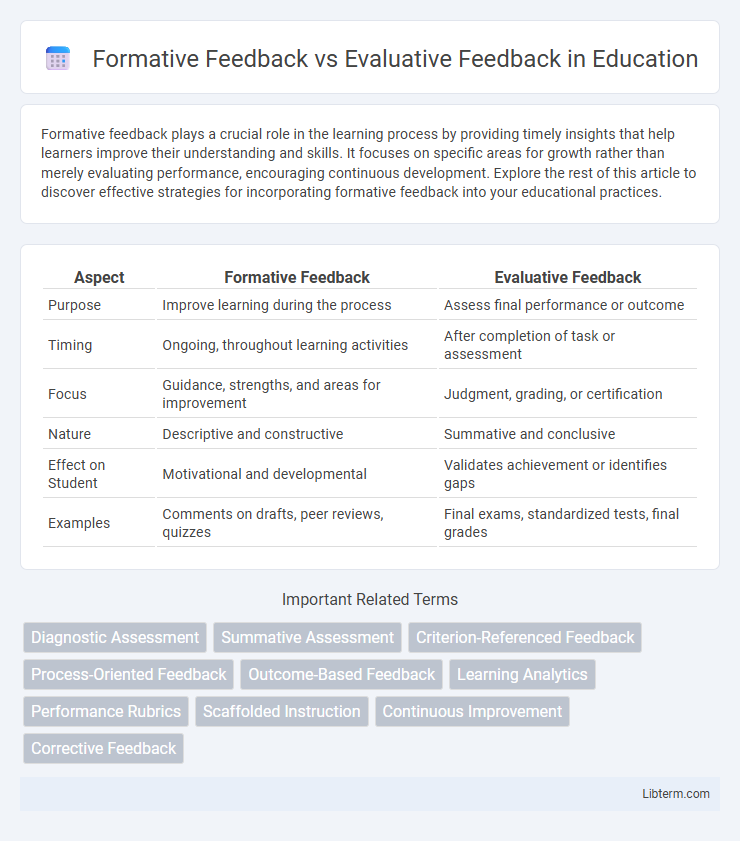Formative feedback plays a crucial role in the learning process by providing timely insights that help learners improve their understanding and skills. It focuses on specific areas for growth rather than merely evaluating performance, encouraging continuous development. Explore the rest of this article to discover effective strategies for incorporating formative feedback into your educational practices.
Table of Comparison
| Aspect | Formative Feedback | Evaluative Feedback |
|---|---|---|
| Purpose | Improve learning during the process | Assess final performance or outcome |
| Timing | Ongoing, throughout learning activities | After completion of task or assessment |
| Focus | Guidance, strengths, and areas for improvement | Judgment, grading, or certification |
| Nature | Descriptive and constructive | Summative and conclusive |
| Effect on Student | Motivational and developmental | Validates achievement or identifies gaps |
| Examples | Comments on drafts, peer reviews, quizzes | Final exams, standardized tests, final grades |
Introduction to Formative and Evaluative Feedback
Formative feedback provides ongoing, specific guidance aimed at improving a learner's performance during the learning process, fostering skills development and deeper understanding. Evaluative feedback delivers a summary judgment on learner performance, typically represented by grades or scores, to measure achievement against set standards. Distinguishing between formative and evaluative feedback is essential for educators to support continuous learning while accurately assessing outcomes.
Defining Formative Feedback
Formative feedback is an ongoing process that provides specific, actionable insights aimed at improving a learner's performance during the learning experience. It emphasizes growth and development by highlighting strengths and areas for improvement without assigning a final grade or judgment. Unlike evaluative feedback, formative feedback fosters a supportive learning environment that encourages continuous progress and skill refinement.
Defining Evaluative Feedback
Evaluative feedback provides a judgment or assessment of performance, often assigning a grade, score, or level of achievement that reflects overall quality or success. It serves to summarize outcomes and determine whether objectives or standards have been met, emphasizing accountability and final results. This type of feedback is essential in formal education settings, professional evaluations, and performance reviews to measure competency and progress against set criteria.
Key Differences Between Formative and Evaluative Feedback
Formative feedback focuses on providing specific, actionable guidance aimed at improving learning and performance during the process, whereas evaluative feedback primarily assesses and grades the outcome or final product. Formative feedback is interactive and ongoing, helping individuals identify strengths and areas for growth, while evaluative feedback is summative, often final, and measures achievement against set standards or criteria. The key differences lie in purpose, timing, and usage: formative feedback supports development and adjustment, whereas evaluative feedback judges and certifies performance.
Benefits of Formative Feedback in Learning
Formative feedback enhances learning by providing timely, specific insights that help students identify strengths and areas for improvement during the learning process. This continuous feedback loop supports skill development, fosters a growth mindset, and encourages active engagement, leading to higher academic achievement. Unlike evaluative feedback, which measures performance outcomes, formative feedback promotes deeper understanding and long-term retention through ongoing guidance.
Advantages of Evaluative Feedback for Assessment
Evaluative feedback provides clear, objective judgments that help students understand their performance relative to established standards, promoting accountability and motivation. It allows educators to identify specific achievement levels, making it easier to measure progress and ensure consistency across assessments. This form of feedback supports data-driven decisions for curriculum adjustments and targeted interventions.
When to Use Formative Feedback
Formative feedback is most effective during the learning or development process, as it provides ongoing guidance that helps individuals identify strengths and areas for improvement before final outcomes are established. It supports skill-building, fosters a growth mindset, and encourages self-reflection, making it ideal for classrooms, training sessions, and project work where continuous improvement is crucial. Using formative feedback early and frequently ensures that adjustments can be made timely, enhancing overall performance and understanding.
Appropriate Contexts for Evaluative Feedback
Evaluative feedback is most appropriate in summative assessment contexts where the goal is to measure and judge performance against established standards or criteria, such as final exams, certification processes, or performance reviews. It provides clear judgments that help stakeholders make decisions about progress, proficiency, or qualifications. This type of feedback is less effective during ongoing learning phases, where formative feedback better supports development and improvement.
Integrating Both Feedback Types for Optimal Results
Integrating formative feedback, which emphasizes ongoing improvement through specific, actionable guidance, with evaluative feedback, focused on summarizing performance against standards, creates a comprehensive feedback system that enhances learning outcomes. Combining these approaches allows learners to understand current performance levels while receiving clear directions for improvement, fostering motivation and skill development. Optimal results are achieved when educators strategically balance formative suggestions with evaluative judgments, promoting continuous growth and accurate self-assessment.
Conclusion: Choosing the Right Feedback Approach
Selecting the appropriate feedback approach depends on the learning objectives and desired outcomes, with formative feedback fostering ongoing improvement through specific, actionable insights, while evaluative feedback provides a summative judgment often linked to grading or certification. Emphasizing formative feedback in educational and professional development contexts enhances skill acquisition and motivation by encouraging reflection and adjustment throughout the learning process. Organizations and educators benefit from integrating both feedback types strategically to balance growth-oriented guidance with performance assessment.
Formative Feedback Infographic

 libterm.com
libterm.com